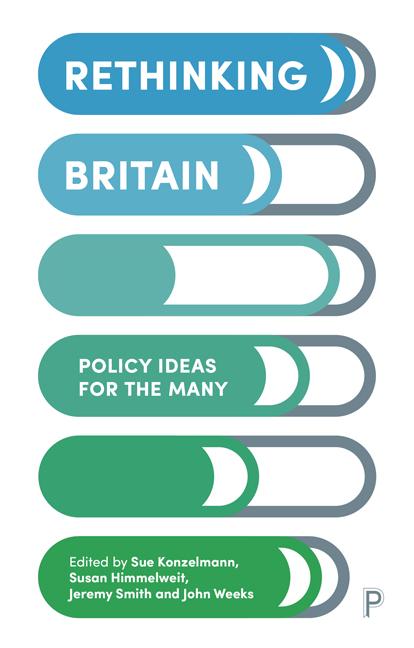Book contents
- Frontmatter
- Contents
- List of Tables and Figures
- The Contributors
- Foreword
- Introduction
- Interlude: ‘Mirror, Mirror, On the Wall – Who has the Highest Debt of All?’
- Part One Building a Full-Employment Economy: Introduction
- Part Two Public Investment – Prioritising Society Rather than Profit: Introduction
- Part Three Making Finance Work for Society: Introduction
- Part Four Genuine Social Security: Introduction
- Part Five How to provide for Social Needs: Introduction
- Conclusion
- Jargon Busters
- References and Further Reading
- Index
8 - How do we make Lifelong Learning a Reality for all?
Published online by Cambridge University Press: 11 March 2021
- Frontmatter
- Contents
- List of Tables and Figures
- The Contributors
- Foreword
- Introduction
- Interlude: ‘Mirror, Mirror, On the Wall – Who has the Highest Debt of All?’
- Part One Building a Full-Employment Economy: Introduction
- Part Two Public Investment – Prioritising Society Rather than Profit: Introduction
- Part Three Making Finance Work for Society: Introduction
- Part Four Genuine Social Security: Introduction
- Part Five How to provide for Social Needs: Introduction
- Conclusion
- Jargon Busters
- References and Further Reading
- Index
Summary
What's the issue?
Despite much talk about the importance of lifelong learning, the UK has never had any universal ‘cradle to grave’ education policy. Instead, it has been assumed that addressing skills sector by sector through industrial strategy will suffice.
Within higher education, the sole focus has been on the provision of the traditional face-to-face boarding school university for 18-year-olds. Policy to widen access has concentrated on getting bright young people from poor backgrounds into elite institutions, while opportunities for mature students to study part time have declined.
This is in part due to lack of funding, but also to the dysfunctional structure of the higher and further education sector, a result of it being viewed by policy-makers as a quasimarket. Indeed, Peter Scott, Commissioner for Fair Access in Scotland, contends that policy-makers view lifelong learning with incomprehension and condescension.
What policies would be effective in reversing the decline in adult part-time study in post-compulsory education?
Analysis
The future working life of young people, both those in the labour market today and those still to enter it, will be very different to that of their parents and grandparents. They will be employed for longer, perhaps in the ‘gig’ economy, and may have portfolio careers with frequent need to learn new skills and move between sectors. Increasingly rapid changes in technology are transforming the world of work in a global context, closing down some industries but creating new ones at the same time.
Universities will have to look at how to remain relevant, how to ensure that students are prepared for industries that we don't yet know will exist, and how to continue to support those same learners throughout their lives. Existing policy does not and cannot address the flexibility needed for universities to do this because it positions higher education as a private good, placing the burden of funding on students and treating higher education as a market. Policy-makers seem to forget that education is a public good too, benefiting society as a whole as well as its direct ‘consumers’.
- Type
- Chapter
- Information
- Rethinking BritainPolicy Ideas for the Many, pp. 216 - 220Publisher: Bristol University PressPrint publication year: 2019



